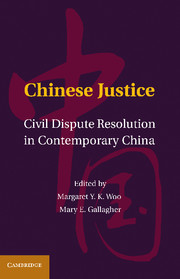Book contents
- Frontmatter
- Contents
- Tables and Figures
- Contributors
- Acknowledgments
- Abbreviations
- Glossary
- Introduction
- PART I LEGAL DEVELOPMENT AND INSTITUTIONAL TENSIONS
- PART II PU FA AND THE DISSEMINATION OF LAW IN THE CHINESE CONTEXT
- PART III LAW FROM THE BOTTOM UP
- Conclusion: Chinese Justice from the Bottom Up
- Index
- References
Conclusion: Chinese Justice from the Bottom Up
Published online by Cambridge University Press: 05 July 2011
- Frontmatter
- Contents
- Tables and Figures
- Contributors
- Acknowledgments
- Abbreviations
- Glossary
- Introduction
- PART I LEGAL DEVELOPMENT AND INSTITUTIONAL TENSIONS
- PART II PU FA AND THE DISSEMINATION OF LAW IN THE CHINESE CONTEXT
- PART III LAW FROM THE BOTTOM UP
- Conclusion: Chinese Justice from the Bottom Up
- Index
- References
Summary
The Old Latin maxim ex oriente lux, ex occidente lex (from the East, light; from the West, law) evinces a deep assumption about the relationship between the East and law – that is, although civilization began in the East, the West is the source of rationality and law. Indeed, much of this assumption lies in present-day “rule of law” programs as they are often transported from the West to transitional economies in the East and South. Rule of law, with its rationality and predictability, is said to be fundamental to a market economy. Its ability to check abusive arbitrary powers is believed to go hand in hand with democratic polities. Pointing to today's industrial democracies, reformers have concluded that rule of law is necessary for economic development and political liberalization.
Yet the challenges to these assumptions are numerous, ranging from whether there is such an East/West divide and, if so, whether the East is really antithetical to law; to the definition of “rule of law” itself and whether legal institutions are indeed transplantable. Furthermore, even as the rule of law has become a new rallying cry for global missionaries, reformers recognize that the rule of law is an exceedingly elusive notion. If “it is not already firmly in place, the rule of law appears mysteriously difficult to establish.”
In its thirty years of economic reforms, China has challenged the pairing of law, markets, and democracy.
- Type
- Chapter
- Information
- Chinese JusticeCivil Dispute Resolution in Contemporary China, pp. 380 - 402Publisher: Cambridge University PressPrint publication year: 2011
References
- 2
- Cited by



